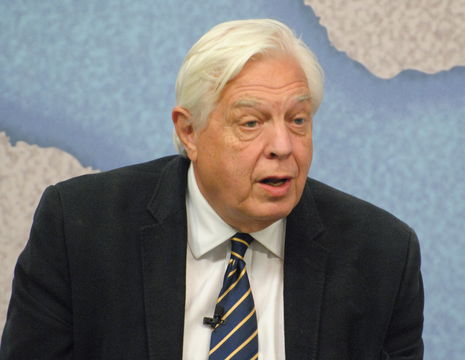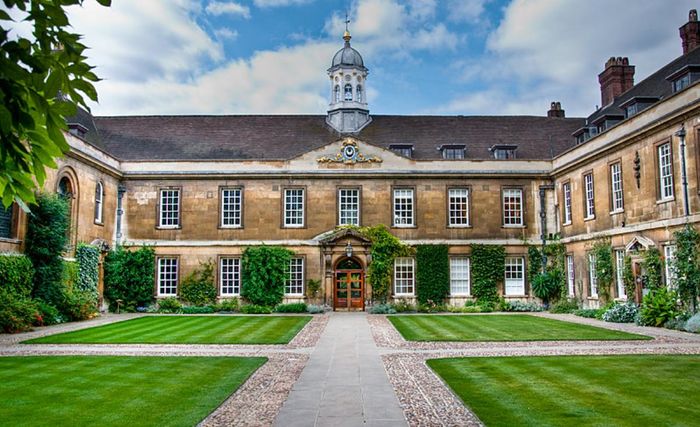“I don’t want these things to be ignored”: BBC’s World Affairs Editor John Simpson
Sophie Denny speaks with John Simpson, about the ‘sense of duty’ compelling him to report on the world’s most momentous events

Having reported from over 120 countries, including 30 war zones, John Simpson – the renowned foreign correspondent and editor of BBC world affairs – sits in a somewhat safer and less stressful location than what he is used to for our conversation. Fresh out of a meeting with his producer, Simpson is speaking to me on a zoom call from a room in London on “one of the two really long days” he has per week. As such, it is perhaps unsurprising that his laptop dies just as he starts telling me about his time at Cambridge.
After fixing his technical difficulties, he starts again: “I’ve got nothing but the happiest memories of Cambridge.”
Between getting married, despite everyone warning that it was a “bad idea”, editing Granta and, prior to this, setting up the newspaper, New Cambridge, Simpson’s time here was a busy one. “Somebody was always starting up a newspaper to rival Varsity and they never succeeded”, he jokes, detailing how, by the end “I was writing all the articles until we finally ran out of money” and bailiffs took his table, chair and typewriter.
While his attempt at competing with Varsity was short-lived, the friendships he made have lasted much longer. He tells me about his “closest friend of all”, Nicholas Snowman, who he met on his first day at Magdalene, and who sadly passed away earlier this year: “I was supposed to have lunch with him the next day”, John tells me solemnly. “[Nicholas] was one of the lovely things that Cambridge gave me”. Despite living in Oxford, Simpson’s memories lead him to affirm: “I still prefer Cambridge.”
Gaining “a kickstart into journalism” while studying, Simpson has gone on to report key international events, witnessing the Tiananmen Square Massacre, and being one of the first reporters to enter Afghanistan in 2001, famously disguising himself by wearing a burka. I ask what drives him to keep returning to war-torn countries and he tells me succinctly: “a sense of duty.”
When reading 1984 as a teenager, Simpson was struck by Orwell’s depiction of censorship, saying: “I just felt then that I really wanted to be on the other side. I wanted to stand up for the act of speaking the truth”. This urge has led him to witness many harrowing events, yet he doesn’t suffer from sleepless nights, despite his own expectations. Recollecting the time the Taliban forced him to watch a triple hanging, he remembers thinking: “I’m going to be waking up at three o’clock in the morning for years to come thinking about this”. While he did have “a series of awful dreams […] I don’t find the ghosts of past things hang around me anymore”, he says. Joking that this “comes from being insensitive and lacking in any kind of human feeling”, he subsequently credits his ability to move on from these events to the therapeutic effects of writing articles: “I’ve dealt with it; I’ve put it in the box marked sorted”.
Fake news has recently become a big issue; according to Statista, 53% of journalists felt that the public lost trust in the media in 2021, and so I ask Simpson for his perspective on journalism’s future. Alongside fake news, he sees artificial intelligence as a great threat, as it “may well try to make us believe that things are better or indeed worse than they really are”. There is no infallible method for combatting this, but it shows that “there is more of a need than ever for people to stand up and bear witness about true things”. His advice for budding journalists is to “be straight with your readers, listeners and viewers every step of the way”. Mistakes will inevitably be made, but it is important to “correct them as quickly as possible, even if it’s a bit humiliating”. Simpson’s sense of duty re-emerges, saying: “you owe it to people to do the right thing.”
After everything he’s seen, you would forgive Simpson for having a pessimistic view of the future, but this is not the case. He has seen the world overcome grave concerns such as overpopulation, as well as society opening up to “people that we used to try to keep outside the little enchanted circle”. He acknowledges that we do face large threats, yet his career has confirmed his faith in humanity: “I’ve never seen big massacres where some people didn’t behave with amazing generosity, courage and humanity”. This hope is epitomised as he concludes our conversation, reciting a John Masefield poem he discovered during his time at Cambridge:
“I have seen flowers come in stony places,
And kind things done by men with ugly faces,
And the Gold Cup won by the worst horse at the races,
So I trust, too.”
 News / Deborah Prentice overtaken as highest-paid Russell Group VC2 February 2026
News / Deborah Prentice overtaken as highest-paid Russell Group VC2 February 2026 Fashion / A guide to Cambridge’s second-hand scene2 February 2026
Fashion / A guide to Cambridge’s second-hand scene2 February 2026 News / Downing Bar dodges college takeover31 January 2026
News / Downing Bar dodges college takeover31 January 2026 Comment / College rivalry should not become college snobbery30 January 2026
Comment / College rivalry should not become college snobbery30 January 2026 Lifestyle / Which Cambridge eatery are you?1 February 2026
Lifestyle / Which Cambridge eatery are you?1 February 2026









